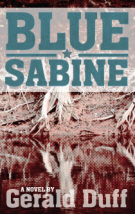| News |
| Thursday, 27 December 2012 00:00 |
|
Blue Sabine Reviewed in the Mid-American Review Sophfronia Scott, of the Vermont College of Fine Arts, recently reviewed Blue Sabine in the Fall 2012 issue (Vol. XXXIII, No. 1) of the the Mid-American Review. Read the review in it's entirity below-- Blue Sabine by Gerald Duff. Springfield, Missouri: Moon City Press, 2011. 315 pages. $19.95, paper. In 1867 Amos Holt, disillusioned and broken from the Civil War, moves his pregnant wife, Carolina Cameron Holt and their two daughters, Abigail and Maude, from Louisiana to Texas by walking them through the chest-high Sabine River bordering the two states. On the night of their crossing, however, a tragic event occurs that ends up rooting the Holts to this body of water for generations to come. With gorgeous, lyrical prose and an irresistibly intimate tone, Gerald Duff allows each of these ensuing Holts, mostly women, to take turns voicing the narrative of Blue Sabine, his seventh novel, and give their own candid assessments of each other while reporting the original details of events that will be discussed and retold throughout the book. Duff performs an intriguing sleight of hand here because he manages to create interesting family stories that never shake up or redirect his characters. Life just goes on —and that's kind of the point. Maude and Abigail, for example, engineer the rescue of a wrongly accused black man from a lynch mob; their brother Lewis loses his eyesight when he insults a prostitute and gets stabbed in the head by her pimp. Over time the stories take on mythological proportions—family lore tends to do that. As the women search for significance in their lives—Maude and her great-granddaughter Dora even ache for it—these stories and the essential knowledge that they are Holts become their comfort when they feel overwhelmed by the vagaries of time. Maude, reminiscing about the family well, makes an observation that captures the heart of the book: "I never liked what looking into that still water said to me... that all our movement to and fro, the freedom we assumed was ours to go where we wanted, the way we talked and made plans and laughed and ate and drank—all that was a lie. Nothing ever really moved. And we were fooled by thinking so." A depressing thought, yes, especially when you consider we are nothing but our genes (Carolina's green eyes in the eyes of Dora's half-Vietnamese daughter Kay-Phuong) and the stories connecting us to those who share them. But Duff shows us that's okay. If this basic knowledge can sustain the Holts for over a century, it can do the same for us all. --Sophfronia Scott, Vermont College of Fine Arts
The Mid-American Review is published by Bowling Green State University and is an international literary journal dedicated to "publishing the best contemporary fiction, poetry, nonfiction, and translations." It is available by subscription. For more information on ordering, please visit their website. |


